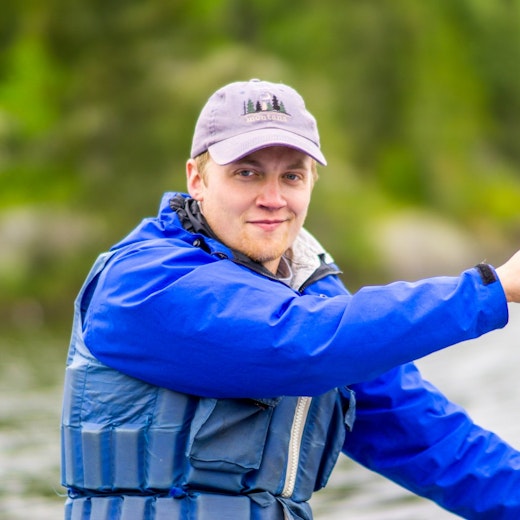
Sitting around the family table in the Mess Hall one night John, Deb, and Vicki Erdmann and Bill Burgman were engaged in one of their favorite pastimes–sharing stories of Camp connections. Between the four of them, I believe they can recall almost every camper who’s attended Camp Voyageur since 1951; Where they’re from, how they found out about Camp, and pieces of their families’ backgrounds. Listening to them debate over which city someone was from, where his dad owned that gas station (It was 1st street. No, it was 2nd street right across from that old market. They sold the best strawberries!), and if he took the train to Ely or Grandpa dropped him off in that old Cadillac (It was a Ford), I couldn’t help but wonder… Why bother trying to recall all those names and details?
Charlie and Mim Erdmann founded Camp Voyageur. They had a son named John, who had a son named Charlie, who had a son named John. Sense a trend? Names are important to the Erdmann family, or perhaps they inherited the first Charlie’s infamous struggle remembering names and like to keep things simple. Fortunately, Charlie’s descendants weren’t named Champ, Ace, or Sporto Erdmann.
Camp Voyageur’s name was inspired by the workhorses of the fur trade, as captured in 1989 with The Voyageur Spirit by Mike Murphy and John Erdmann, which begins, “As the French Canadian Voyageurs of old toiled to open the northwoods, so too are you encouraged to travel new waters at Camp Voyageur.” The name voyageur imbues toughness, camaraderie, and adventure into the summer camp. It’s hard to imagine Camp’s culture would be the same had it been named Camp Cream Puff owned and operated by Champ Erdmann.

When a child enrolls to Camp Voyageur, their last name may show they’re related to a current or former camper. A peek at their school’s name might reveal that a classmate, who loves talking about his summers up north, referred them. A camper’s hometown may highlight connections with one of the many pockets of Voyageur alumni scattered throughout the world. If their last name, school, and hometown don’t ring a bell, then they probably stumbled upon Camp on the Web.
Every camper has a legacy at Camp whether or not he descends from the ancient CV warriors of the past or he’s the vanguard in his family, forging a new path in the Northwoods for generations to come.
Chris Smith, Legacy Matters
Just as a camper’s name hints at their connections with Camp Voyageur, a lake’s name holds clues to its history. Knife Lake, arguably the Boundary Waters’ most famous lake, was an international trading hub for thousands of years. Knives made from its rocky shores have been uncovered worldwide. Knife Lake’s final human resident, Dorothy Molter, increased its allure when she battled lawmakers, winning the right to live out her days in the Boundary Waters after it became a designated wilderness with no residents allowed. She spent her final decades selling root beer to thirsty paddlers who visited her Isle of Pines. Would Dorothy’s legacy be different had she lived on Mud Island on Hog Lake?
Perhaps the name doesn’t matter and Dorothy would be famous wherever she sold root beer in the Boundary Waters. I’ve paddled lakes with unique Ojibwe names like Ogishkemuncie, Kekakabic, and Gabimichigami, as well as more common names like Moose, Mud, and Long. So far, I haven’t found a correlation between a lake’s enjoyability and its name, although one’s mind does tend to wonder while paddling across them how those lakes got their names.

Ogishkemuncie, Kekakabic, and Gabimichigami aren’t just tongue twisters; they mean “Kingfisher,” “Hawk’s nest on the rocks,” and “at the place of the big rock,” respectively. Those names likely held significance to the Ojibwe people. Camp lies at the end of Voyageur Road, between the Kawishiwi River and Farm Lake. Kawishiwi River translates loosely to “many beavers and muskrats” and those critters still reside there in abundance. Farm Lake was named from the fact that the Ojibwe people practiced primitive agriculture around the lake, which explains its white oak tree population, a forester once pointed out. Voyageur Road, well, you can guess how that got its name.
Learning the stories behind names is thought-provoking. Sure, a name is just a label, but it’s also a thread that ties us to history, memory, and one another. It sparks connections and curiosity, and sometimes even inspires adventure. Whether it’s the name of a former camper’s dad’s gas station (It was a grocery store) or a lake in the wilderness, names become doorways to stories—some we know, others we can only guess. Piecing together fragments of memory around the table in the Mess Hall reminds me that it’s not just the names that matter, but the stories we tell because of them.
What’s your favorite story behind a name? Let us know in the comments!
You might also like:
- Legacy Matters by Chris Smith
- Beyond the Tower by John Erdmann
- Wise Words From Our Past by Peter Grunawalt



